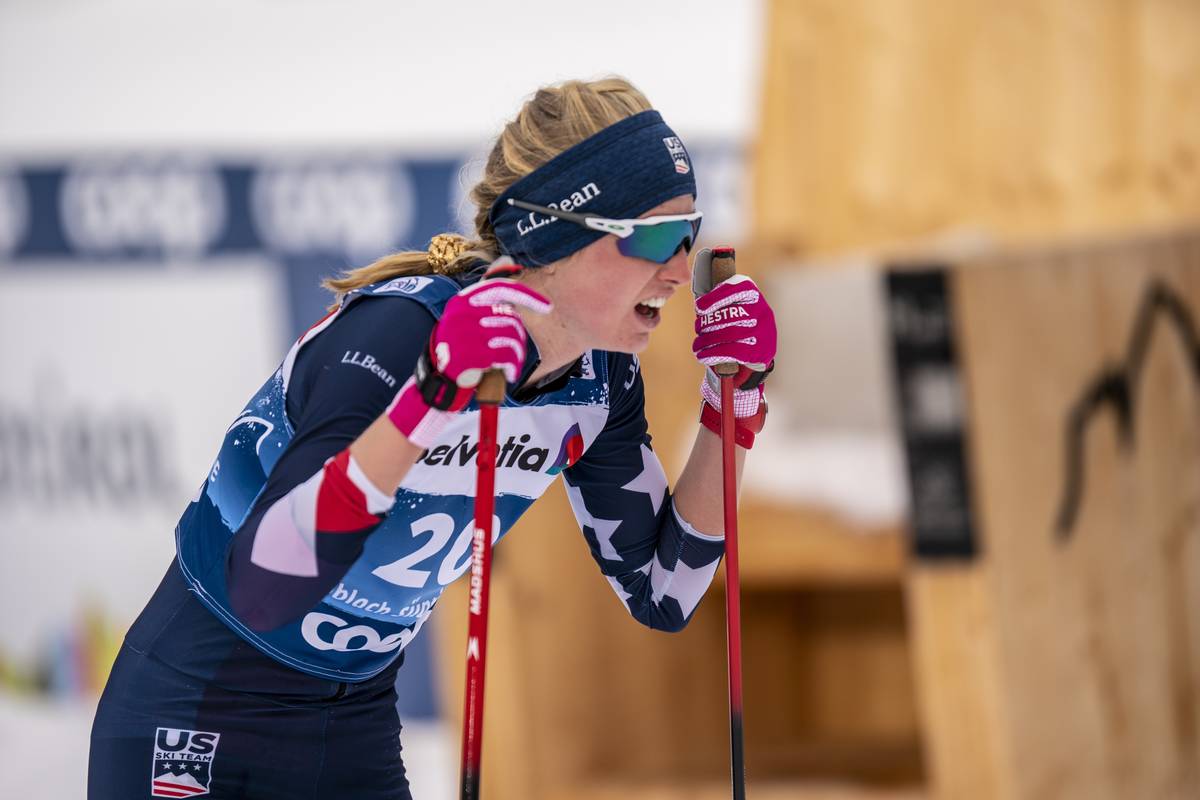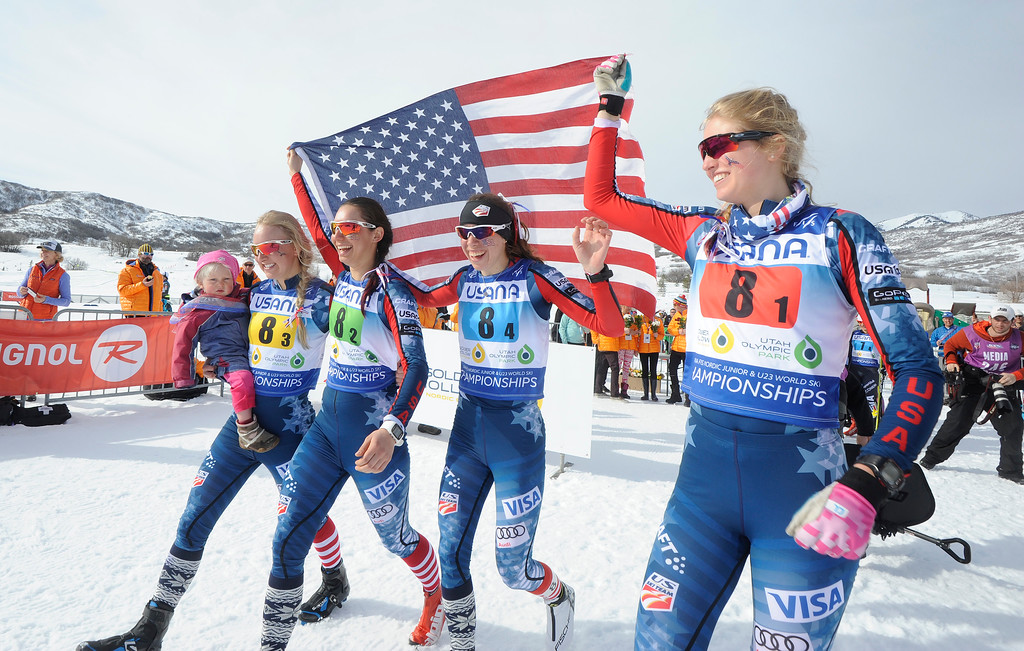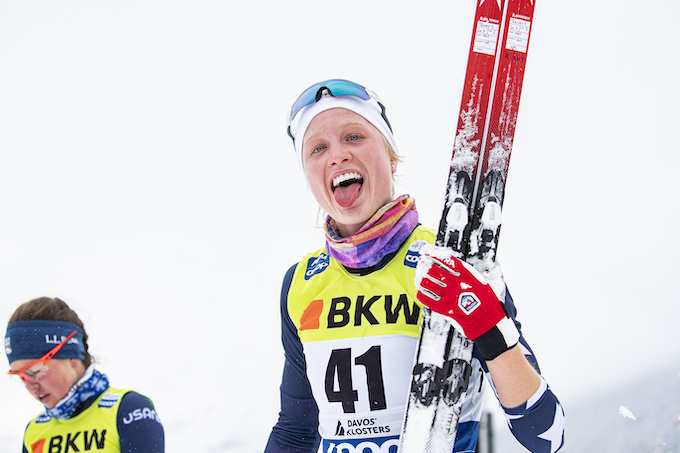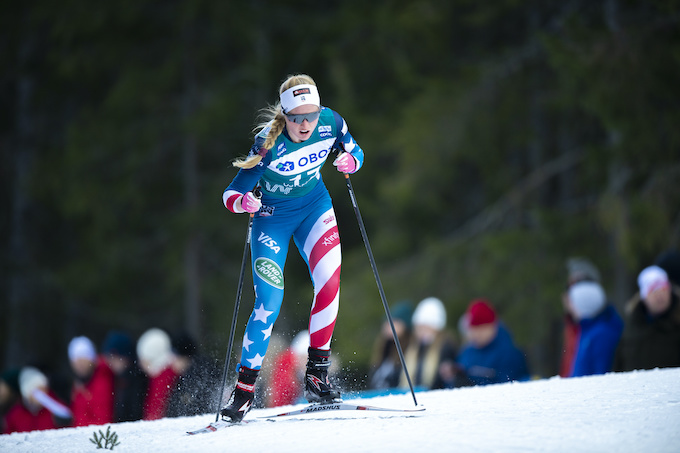
“She Showed Us What We Young Americans Can Achieve.”
This article was originally published in the Italian publication www.fondoitalia.it. This translated version, lightly edited for clarity, was shared with FasterSkier by the author.
If Hailey Swirbul can be considered the most successful American cross-country skier ever at junior level and last season was able to get her first World Cup podium in Davos’ 10km classic, the “blame” or merit is — at least in part — due to her brother Keegan.
Three years older, Keegan Swirbul is a good perspective-cyclist who is part of American professional team Rally Cycling, best known at home under the nickname “Flying Swirbul” for his good skills as a climber. In fact, it was Keegan ten years ago who convinced his younger sister to start cross-country as a winter discipline for keeping them in good condition before starting the spring season on two wheels. And given the great admiration that Hailey has for her brother, it was easy for her to put on cross-country skis and follow him along the suggestive tracks that characterize her native Roaring Fork Valley of Colorado.
Now 23-years-old, Hailey was born in Grand Junction, Colorado, but just before kindergarten, her family moved to the small town of El Jebel, along the panoramic valley that follows Highway 82 from Glenwood Springs to Colorado’s ski pearl, the renowned Aspen.
As a child she started with alpine skiing as soon as she learned to walk, a must for those kids who live about twenty miles from Aspen. During the summer, with her brother her outdoor activities were long excursions along the valley riding mountain bikes or climbing the local high peaks. When Hailey was ten years old, pushed by Keegan, she started with cross country although initially in fifth grade she also participated in freestyle and moguls programs.
A passion for cross-country grew in her, year after year, in parallel with her strong commitment to school, which made Hailey a model student while attending Basalt High School.
To better portray Hailey outside of competitions, Basalt High School Principal Peter Mueller gave us a perfect picture of Hailey’s character and her extreme commitment in those profitable years of high school:
“Hailey was a super student here at Basalt. She is one of the few native English speaking girls who has reached the highest levels in Hispanic classes and was able to converse freely with our emerging bilingual Latinos students. She loved making delicious crepes which she shared with other students and often sold in our corridors to raise money for some good causes. Hailey brought her ‘can do- attitude’ to both her academic work and her skiing. And when she struggled some in her athletic transition between high school and college, I could see how carefully she reflected on what might need to change in order for her to feel strong again. Hailey cares deeply about sport and equally about caring for those in our community. She is a special talent and our school could not be more proud of her!”
In 2017, the American skier got national selection to compete in her first Junior World Championships in Soldier Hollow. In 4 x 3.3 kilometer girl’s relay she was awarded with the first leg and she, together with her loyal companions, Julia Kern, Hannah Halvorsen, and Katharine Ogden, led the stars and stripes nation to conquer an historical bronze medal.
After graduating from Basalt High School, Swirbul moved to Anchorage to start University at Alaska Pacific to study civil engineering where next December she is earning her hard-earned degree. The following season in her second World Junior Championships in Goms, she got two medals, silver in 5km classic and bronze in skiathlon, making her the most decorated American cross-country skier in history at the under 20 level.
After racing mostly on competitive American SuperTour, the rest is recent story with Hailey entering US national team, getting her first World Cup points in Davos and, one season after, always in the Swiss ski resort her first World Cup podium in a good and almost full time past season at senior level who has brought the Colorado native then competing at her first World Championships in Oberstdorf where she was included in US team women’s relay who missed medal for just eight tenths of second.

Here is a recent interview between Hailey and the author:
Looking back at your last season, you got your first World Cup (WC) podium in Davos and stayed in Europe for almost all periods of races there. Are you satisfied with your last season in the WC circuit?
“In some ways, I am happy with my season and with the good results I got, even though it was a difficult season due to Covid and restrictions. It is difficult to be on the road and away from home for so long, so that has also been a great challenge for me. I didn’t know what to expect from my first full-time season on the World Cup, so I’m a little surprised by the good results I got in the first period of racing. Then, after the Tour de Ski, I had some ups and downs. I was hoping to feel better during the World Championships in Oberstdorf, but it was not a great week for me. At the same time, I am happy because I learned a lot there and now I take it all with me.”
You were with Jessie Diggins the day she got Crystal Globe in Engadin. How were you feeling during that historical day for American skiers?
“It has been amazing for all of us. I don’t think it was even thinkable for us as a nation to happen fifteen or ten years ago. My generation is the start of the generation that has seen the beginning of this thanks to Kikkan, Jessie, Rosie, and Sadie who have achieved results that had been thought impossible on the World Cup for an American cross-country skier. And now for my generation, that we have seen this, her success is an example of what we can do in future . But it also wasn’t surprising that Jessie won the crystal globe, because she is such a dedicated athlete and an incredible cross-country skier. I was also very excited that day to see her dream come true, but she didn’t surprise me much in the end. I knew that this historic day for the USA XC team would come.”
You have lived and trained the whole winter season with Jessie. What are the main things you learned and possibly taken from such an important leader on the USA XC team?
“I think Jessie brings such a positive outlook to our sport, and it’s great that we have a great opportunity to learn new things from her. She has had a big impact on me as a young athlete. She always gives everything in competition, she puts a lot of herself and her whole heart in everything she does, and she is a very competitive skier who loves to win. She inspires me a lot even when there are difficult moments to face. Jessie is always a happy person and she is also as real in private life as she appears in front of the cameras or with the media.”

How difficult is living for more than 5 months far from home, family and friends as you American skiers tend to do? Last year you split your season in two parts to reduce this toll.
“Yeah. This is a very difficult aspect for every member of our USA team although we all experience it in different ways. For me it was a difficult experience to overcome. For example, when you are in a hotel, you always have to follow the same routine: eat-train – compete – sleep, and it is difficult to have control of your life day after day during these periods in which are you away from home and friends.
“But at the same time I think we have a unique chance to bond everyone together as a team, to create a very close and united team. I really think that in this way we have created a true team culture all together, veteran and youngster. Living almost five months on the road is a challenge for all of us but I think that last season, we as Americans figured it out quite well throughout the whole calendar. However, it would be nice for us if the World Cup would make more stops in North America in future. I come from Colorado and here we have even more interesting tracks than some places we usually find in Europe and the same can be found in Alaska where I train and I have often competed in our American SuperTour. ”
What is your program thinking of the next Olympic season?
“Next year is going to be very interesting for me, because it will be my first Olympic year, and it will be a challenge for me to figure out how to deal with pressure and the expectations I have for myself to compete better and show improvements from last season. My plan at the moment is to stay in Europe for the first period of racing and do the Tour de Ski. Then I will probably go back to the States to have some rest, recharge myself a little and then be able to prepare as best as I can for the Olympic Games in Beijing. Obviously, the goal is to get in top shape, both physically and mentally in February. ”

For American newspapers, TV networks and US supporters, the Olympic Games are the main event in the sport. Do you feel pressure about it or are you preparing yourself with a particular attention on this side?
“This will be an interesting point for me to manage. Because here for the Olympics suddenly everyone wants a piece of you. In the United States it is difficult to have sponsors during the other three years, but during the Olympic year it happens that everyone wants to work and support your activity. It is a very high-profile event here in the United States and this has also recently been seen with the Tokyo 2020 Games. In the past many people I met often said to me, ‘I want to see you at the Olympics’, or ‘I will definitely come on site if you are at the Olympics,’ ect. And this is crazy because the same people don’t pay the same attention to us for the World Cup races that there are every week. Most people in the US don’t really care about cross-country skiing except for the Olympics. This will be a challenge for me because of the pressure that will be there and it will be important for me to learn how to manage pressure on a psychological level and to maintain a good balance and to know that I am worth the same, and there is more to me than whether I have an Olympic medal if this does not happen.”
What are your main strengths in cross-country and in which aspect do you feel you have to work most?
“I think my strong point is knowing how to use my lower body in the best way and to use my legs as best as I can to lead skis, especially in skating. Although I love classic, I need to improve in classical technique as my double poling is not strong enough and I need to work on improving strength in my upper body.”
Tell us a bit about the cross-country situation in the USA? Do you think that the interest, passion and sponsor investment in our discipline there are growing compared to ten or fifteen years ago?
“Interest in cross-country skiing here is growing exponentially. A lot of this is to be credited to the successes of our high profile figures such as Jessie, Sadie, or Rosie who are able to inspire younger kids to make their dreams come true and that now we have these dreams to get to the top of the world possible. In the States there are more and more people who are turning their interest to our discipline, and our national programs that start from elementary school are more and more efficient. What is interesting is that with Covid, cross-country skiing exploded in our country because with this pandemic situation many kids had more free time and were able to better appreciate the simple pleasure of doing outdoor activities. And cross-country skiing is a perfect discipline to experience this at its best. There are more and more people on the cross-country tracks here, our sport is definitely growing a lot, and in the future, new American talents will arrive at the top positions at international level. ”

Together with being in Davis U.S. Cross-Country Team, you are also a student at Alaska University. How do you manage lessons, exams and training?
“It is not an easy thing to deal with. I will graduate next December in civil engineering after a long journey that has lasted five and a half years. Before COVID, it was not easy to find the right options with the teachers to best attend lessons, and gave me the right resources when I was with my team on training camps or competing in Europe. Paradoxically, when COVID arrived, I was able to continue more effectively with online courses and exams.
“In all these years it has not been easy to balance school with my training, competitions, travels, and national camps ect., and I have always put a lot of myself in both reals, even when it was busy, and even this summer. I am also attending an internship in engineering, but they are all great life experiences and challenges that are worth facing.”
Unfortunately, your teammates Sadie Bjorsen and Sophie Hamilton-Caldwell retired at the end of last season. Do you feel more pressure on you inside the team now? And are you ready to make another step up as you did last season?
“This will be an interesting point within our team with the lack of these two great female skiers. The dynamics will change as half of our older group retired in just a year, and they will leave a big hole in us as the two of them were always incredibly positive and supportive with us youngsters. At the moment I don’t feel the pressure to be as great as Sadie and Sophie were, as I feel I can only give the best of what I can and not have to be on a level written on paper or have to get this or that given result. But surely we will miss them a lot in the coming seasons. ”

You are the most successful American skier at junior level in history. How proud of yourself are you? And do you consider this just a starting point for more victories in World Cup level?
“I don’t know exactly what to say. The World Cup has a completely different way of competing and an incredibly high level of cross-country skiers who race in it compared to junior competitions. It is also very different to spend five months in Europe instead of the two weeks we did at a junior or youth level, and I think that all the various factors of adapting to the new senior circuit, dealing with the pressures that exist at these levels, are different.
“For example, many of my achievements at the junior level were a sort of surprise for me too. I didn’t expect to get all those medals at the junior level, and many people around me were also surprised. I think it is different when you then make somewhat of a name for yourself internationally to keep that level too, since you then have new expectations on yourself. Many think that if you are good at a junior level then you can also be at a senior level, but this step is not so obvious and simple. I just hope to give my best as I pursue my career and to help the team and my nation as much as possible. This is my goal at the moment rather than just achieving a win. ”
Who do you think will win first? You in the Tour de Ski or your brother Keegan in the Tour de France?
“My brother had some physical problems at the start of this season, but he has done well in the Tour of Portugal recently and I am very happy for him that he is doing well now. I want to remain humble and I say he will win first as I know from an early age his dedication and all the work he has done in becoming a pro cyclist. I still have time for the Tour de Ski. (laughs)”



